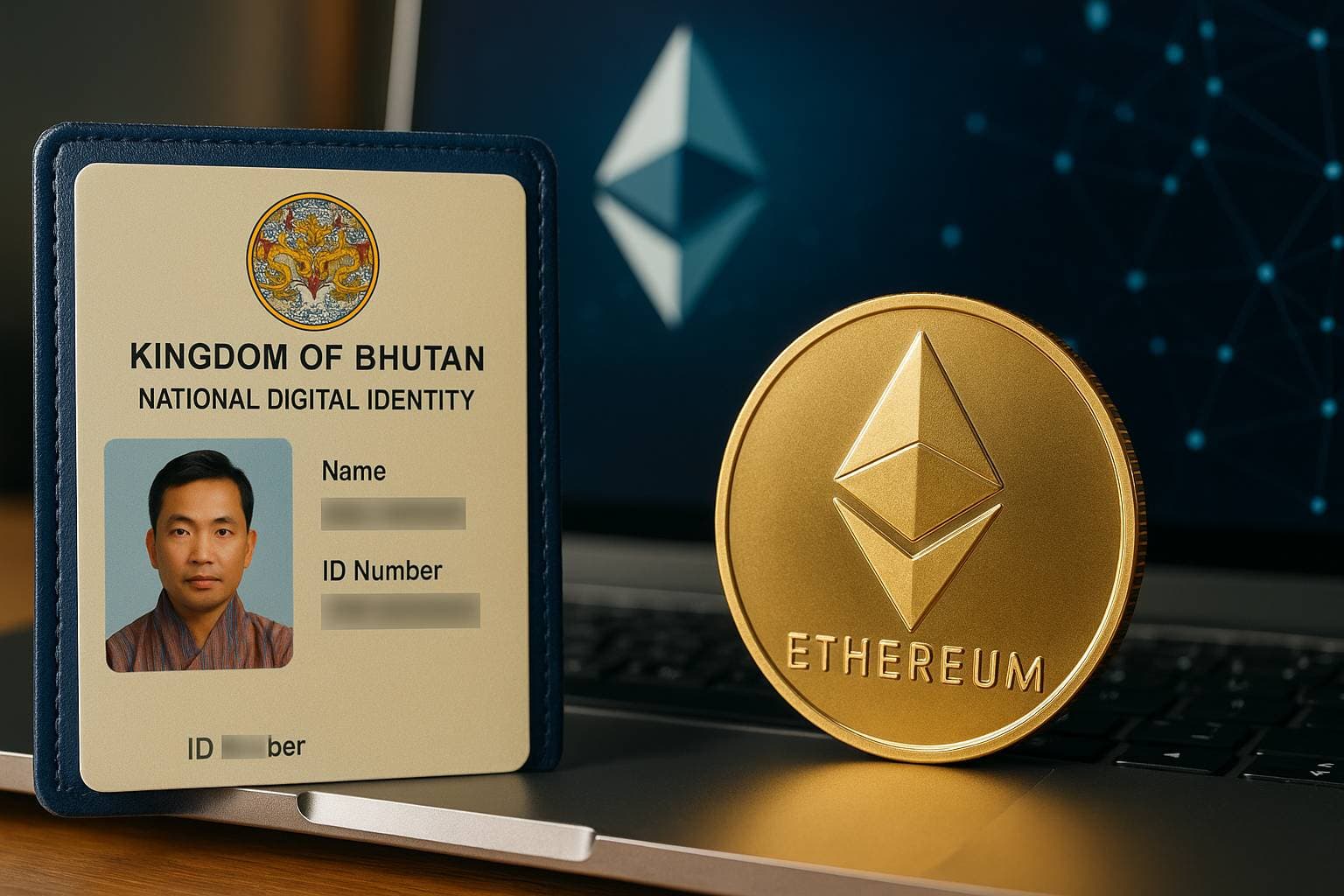A Small Nation, a Bold Experiment
Bhutan, a Himalayan kingdom better known for measuring happiness than GDP, is quietly rewriting what digital sovereignty means. In a move that surprised many in the global blockchain community, Bhutan announced that its National Digital Identity (NDI) system is migrating to the public Ethereum network, becoming the world’s first government to anchor population-scale identity credentials on a global, decentralized ledger.
Originally built on Hyperledger Indy, Bhutan’s NDI transitioned to Polygon in 2024 for scalability. But by late 2025, officials confirmed a full migration to Ethereum — citing improved decentralization, data integrity, and global interoperability. The change could transform how nations manage identity and citizen data in the digital age.
The migration affects roughly 800,000 residents, enabling them to verify credentials such as citizenship, licenses, or education records using self-sovereign identity (SSI) principles. The system uses W3C-compliant verifiable credentials, meaning personal data never sits directly on-chain — only cryptographic proofs that verify authenticity.
Find more article like this in Blockchain and Regulation
Why Ethereum — and Why Now
Bhutan’s Digital Identity Department described the switch as a step toward “trust through transparency.”
By using Ethereum, Bhutan avoids vendor lock-in and taps into the largest smart contract ecosystem in the world. Ethereum’s stability, validator diversity, and maturing zero-knowledge ecosystem reportedly made it the most credible home for a sovereign-scale project.
The country’s leadership, through its investment arm Druk Holding & Investments (DHI), already maintains an active blockchain presence. DHI previously partnered with Ripple for cross-border remittances and invested in Bitcoin mining initiatives powered by Bhutan’s hydroelectric grid. The NDI migration further cements the nation’s strategic shift toward Web3 infrastructure as a pillar of national modernization.
Privacy in the Open
Critics argue that placing any form of national identity on a public blockchain invites privacy risks.
However, Bhutan’s implementation appears designed to protect individuals while benefiting from Ethereum’s transparency. Instead of storing personal data, the NDI writes on-chain proofs — hashed representations of credentials that confirm validity without revealing sensitive information.
That design aligns with European privacy standards, including GDPR-style data minimization, which requires that users control who accesses their information. Bhutan’s approach could set a new global precedent for reconciling data protection laws with decentralized infrastructure.
If it succeeds, the project might become a blueprint for how nations in Asia and Africa handle identity issuance without relying on centralized databases prone to breaches or misuse.
The Global Signal
Bhutan’s pivot has caught the attention of policymakers across developing economies.
Smaller states often struggle with digital identity due to limited budgets, fragmented databases, and dependency on foreign tech providers. Ethereum, with its open ecosystem and global validator base, offers something these governments rarely have — neutral trust.
Blockchain analysts note that this is more than a technical upgrade. It’s a philosophical one.
By migrating to Ethereum, Bhutan effectively treats digital identity as a public good, not a state-controlled asset. It also demonstrates that blockchain sovereignty doesn’t require isolation — it can mean participation in a trusted, shared global system.
Some observers believe the move could accelerate adoption of decentralized identity models in nations exploring digital citizenship, cross-border e-residency, or CBDC verification frameworks. Others caution that the transition exposes Bhutan to Ethereum’s congestion, gas fees, and governance challenges.
The Risks and the Road Ahead
Moving an entire country’s identity framework to a public chain is not without danger.
Even though data is off-chain, the system relies on smart contracts and oracles that could become attack vectors. Any exploit could disrupt access to essential services — from banking to healthcare.
Experts suggest Bhutan may eventually integrate Layer-2 rollups or zk-proof architectures to handle scaling, privacy, and cost issues. That would allow faster transactions while keeping data private and verifiable.
Government officials have stated that full migration will be phased through Q1 2026, with user wallet updates and education programs already underway. As the rollout continues, global organizations such as the World Bank and UNDP are reportedly monitoring Bhutan’s progress as a test case for digital identity resilience.
Global Implications in Motion
If Bhutan’s Ethereum ID succeeds, it will challenge long-held assumptions about governance.
Identity could evolve from something citizens receive to something they own — portable, verifiable, and sovereign. For Ethereum, it’s another step toward becoming not just a financial layer, but a civilizational layer — one where trust is programmable and nation-states are participants, not gatekeepers.
The world will be watching as Bhutan’s citizens log in, verify, and prove who they are — not through government portals, but through cryptographic signatures written on the world’s most transparent ledger.
A Turning Point for Digital Sovereignty
- Bhutan becomes the first nation to anchor its national identity system on Ethereum.
- The shift reflects growing trust in public blockchains for government infrastructure.
- Data privacy is maintained through off-chain proofs and verifiable credentials.
- The project could inspire similar models across developing nations.
- The outcome will define whether decentralized identity can truly scale at a national level.

